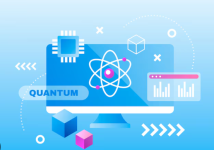Computers have come a long way from bulky, room-sized mainframes to slim, pocket-sized smartphones. But the next evolution is far more exciting — computers are becoming intelligent, self-adaptive, and deeply integrated into every aspect of our lives.
The future of computing won’t just be faster processors or more memory — it will be about how computers think, interact, and make decisions alongside humans.
In the near future, we’ll see computers that are:
Instead of a single device, we’ll be surrounded by an invisible mesh of computers constantly sensing, processing, and responding.
Software will become more human-like in behavior and more personalized than ever before.
As computers evolve, so will:
But this future will also raise ethical questions about surveillance, data ownership, and human dependency on machines.
While the future is exciting, it comes with challenges:
This makes it vital for governments, companies, and citizens to build ethical, inclusive, and secure computing ecosystems.
The future of computers is not about making machines that compute faster — it's about creating systems that understand us, learn from us, and evolve with us.
We’re heading toward a world where computers will no longer be just tools — they will be collaborators, co-thinkers, and companions in our digital journey.
How do you imagine your daily life with quantum computers or brain-controlled devices?
Do you think future computers will still need human operators, or will they become fully autonomous?
Share your thoughts in the comments!
The future of computing won’t just be faster processors or more memory — it will be about how computers think, interact, and make decisions alongside humans.
Key Trends That Will Shape Tomorrow's Computers
- Quantum Computing
- Quantum computers use qubits instead of traditional bits, allowing them to process exponentially faster.
- Companies like IBM, Google, and D-Wave are already developing functional quantum systems.
- Applications include complex simulations, drug discovery, weather forecasting, and encryption-breaking.
- Artificial Intelligence Integration
- Computers will not just execute code but understand data patterns, make decisions, and even predict outcomes.
- AI-powered personal assistants and autonomous systems will become standard.
- Neural Interface Technology
- Brain-computer interfaces (BCI) will enable humans to control devices using just their thoughts.
- Projects like Neuralink are already testing these concepts.
- Edge Computing and Decentralization
- Processing power will move from centralized servers to edge devices (IoT systems, cars, wearables).
- This reduces latency, increases speed, and enhances data privacy.
Smarter and Smaller: The Hardware Revolution
In the near future, we’ll see computers that are:
- Smaller than a grain of rice (nano-computers)
- Wearable and implantable (smart glasses, biochips)
- Flexible and transparent (used in smart textiles and e-paper)
- Environmentally sustainable (powered by solar or biodegradable materials)
Instead of a single device, we’ll be surrounded by an invisible mesh of computers constantly sensing, processing, and responding.
Software of the Future
- Self-healing code: Programs that detect and fix bugs without human input.
- Context-aware systems: Apps that change functionality based on user behavior, location, or environment.
- AI-generated code: Developers using tools like GitHub Copilot or GPT-based AI to write code faster and more accurately.
- Voice- and gesture-based interfaces: No more clicking — computers will recognize speech, motion, and expressions.
Software will become more human-like in behavior and more personalized than ever before.
Impact on Society and Work
As computers evolve, so will:
- Jobs: Many roles will require digital literacy, AI collaboration, and cybersecurity knowledge.
- Education: Virtual labs, AI tutors, and holographic classrooms will become common.
- Healthcare: Computers will diagnose diseases, assist in robotic surgeries, and manage hospital workflows.
- Governance: Smart cities powered by computer systems will manage traffic, energy, waste, and public services efficiently.
But this future will also raise ethical questions about surveillance, data ownership, and human dependency on machines.
Risks and Responsibilities
While the future is exciting, it comes with challenges:
- Cybersecurity threats will become more sophisticated.
- Digital inequality may widen the gap between the connected and the unconnected.
- AI bias could lead to unfair decisions in finance, healthcare, and hiring.
This makes it vital for governments, companies, and citizens to build ethical, inclusive, and secure computing ecosystems.
Conclusion
The future of computers is not about making machines that compute faster — it's about creating systems that understand us, learn from us, and evolve with us.
We’re heading toward a world where computers will no longer be just tools — they will be collaborators, co-thinkers, and companions in our digital journey.
Invitation to Discussion:
How do you imagine your daily life with quantum computers or brain-controlled devices?
Do you think future computers will still need human operators, or will they become fully autonomous?
Share your thoughts in the comments!

